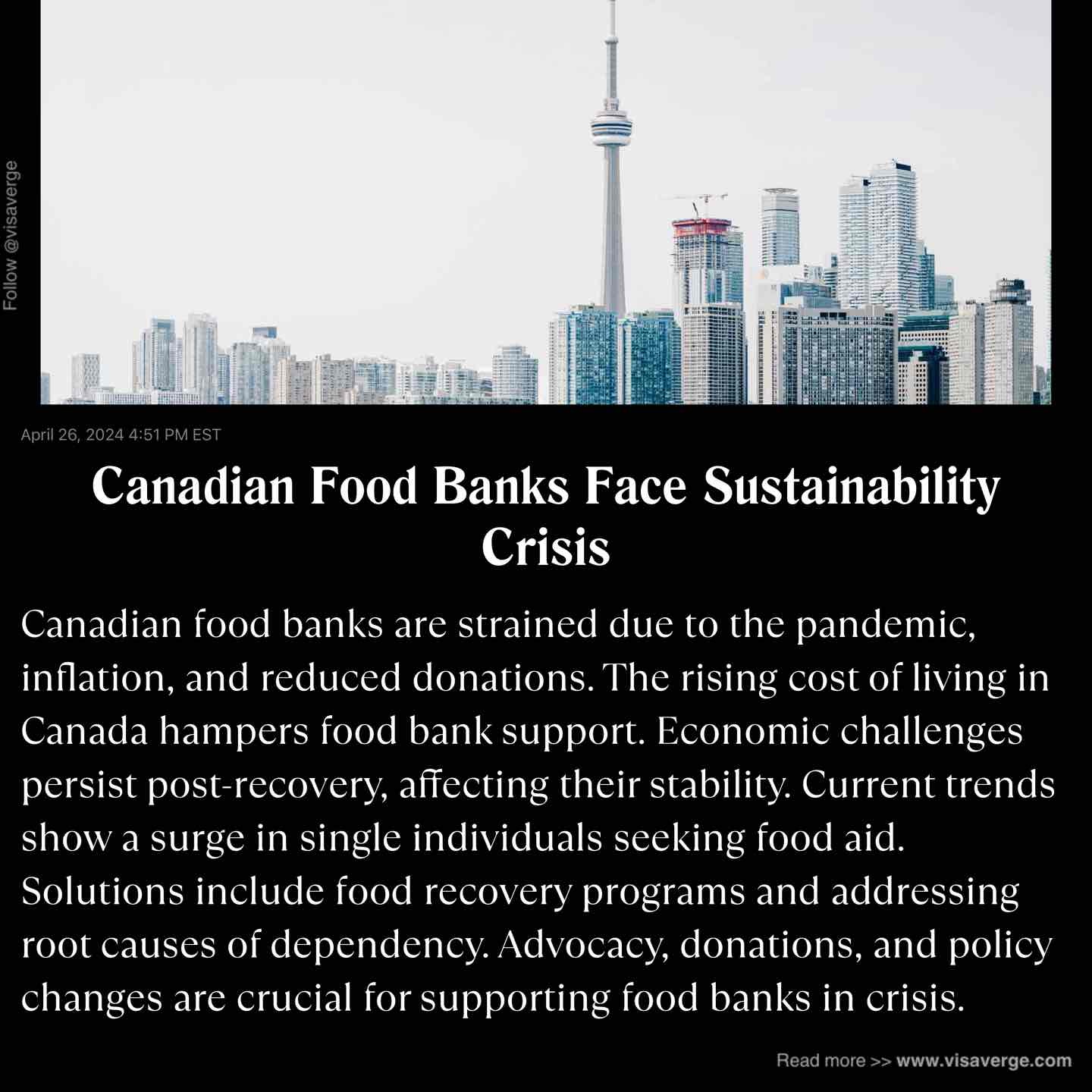What is the Current State of Canadian Food Banks?
In recent years, Canadian food banks have experienced unprecedented strain. The challenges of a global pandemic, combined with rampant inflation, have dramatically increased the demand for food banks across the country. Kirstin Beardsley, CEO of Food Banks Canada, articulates the crisis, stating, “When you see the rates of growth that we’ve seen and the strain, the amount of donations that we need to see coming through the door either stagnate or not keep up the pace, this is not a sustainable situation.”

How Severe is the Impact of the Cost of Living on Food Banks?
Over the last few years, the cost of living in Canada has soared, particularly affecting the affordability of groceries. This surge has directly impacted donations to food banks, which are not increasing at a pace necessary to meet the growing demand. A 2023 report from Canada Helps highlighted that 57.3% of charities cannot meet current levels of demand, and 31.5% of charities raised less money than in the previous year. Furthermore, there has been an 8 percentage point increase over nine months in Canadians relying on charities for basic needs, totaling 22% of the population.
Food banks, primarily funded through community contributions, face significant challenges in this financial climate. Sharon Palmer, the executive director of the Barrie Food Bank in Ontario, revealed their recent financial shortfall: “Although we managed to meet our food collection goal, we were $100,000 short on our financial goal.”
How Do Economic Challenges Prolong Food Bank Strain?
While the Canadian economy may show signs of recovery, food banks continue to grapple with extended periods of need. Beardsley explains, “Food banks tend to deal with economic challenges for a much longer stretch than you see represented in federal data or statistics.” This prolonged demand post-economic downturn is something food banks uniquely contend with as they support communities in stabilizing.
What are the Demographic Trends in Food Bank Usage?
Recent trends indicate a significant shift in the demographics relying on food bank services, with single individuals forming one of the largest groups. Single people often face the full burden of living expenses, making them particularly vulnerable. Palmer notes the continuing high demand: “Over the last few months, demand for our services has reached a peak and is staying around 7,000 people each month, which is an awful lot of people needing food support on a monthly basis.”
What Solutions are Being Considered to Alleviate the Pressure on Food Banks?
Food banks are increasingly turning to food recovery programs to bridge the gap between supply and demand. These programs involve diverting food that is near expiry from grocery stores, food suppliers, and farmers to those in need. This approach not only addresses food waste but also provides timely help to those in a crunch.
Moreover, addressing the root causes that lead people to rely on food banks can significantly reduce this dependency. Palmer suggests, “I’d rather have policies that help encourage employment and create more availability of housing,” advocating for preventive measures that could decrease the necessity for food bank services.
What Can You Do to Support Canadian Food Banks?
Supporting Canadian food banks in times of such high demand and challenging conditions is crucial. Whether it’s through direct donations, volunteering, or advocating for policies that address income and housing affordability, every action counts. Beardsley encourages those unable to donate financially to advocate for change: “Talk to elected officials about the need to invest in making sure that low-income folks have higher incomes, that we are addressing the affordability crisis in Canada, and that governments take action.”
For more detailed information on the structure and support mechanisms of food banks in Canada, please visit Food Banks Canada.
Final Thoughts
The situation at Canadian food banks is reaching a critical point, driven by an unsustainable mismatch between demand and donations. Both community leaders like Beardsley and Palmer are calling for a multi-faceted approach to alleviate the pressure on food banks. This involves not only immediate relief through donations and food recovery efforts but also long-term policy changes to tackle the underlying economic issues. The vision of a Canada where no one goes hungry is ambitious yet attainable with collective effort and strategic action.
Learn Today:
- Food Security: Food security refers to the state in which all people, at all times, have physical and economic access to sufficient, safe, and nutritious food to meet their dietary needs and food preferences for an active and healthy life. The strain on Canadian food banks is indicative of challenges related to food security, where individuals and communities may struggle to access an adequate supply of food due to various socioeconomic factors.
-
Donations: In the context of food banks, donations refer to goods or money given to support the provision of food assistance to individuals and families in need. Food banks rely on donations from individuals, organizations, and businesses to maintain their operations and meet the increasing demand for food assistance, particularly during times of economic hardship or crises.
-
Food Recovery Programs: Food recovery programs involve the collection and redistribution of surplus food that would otherwise go to waste. These programs aim to divert food nearing expiry or excess food from supermarkets, food suppliers, and producers to food banks and charitable organizations, ensuring that it reaches those facing food insecurity instead of being discarded. By repurposing surplus food, food recovery programs help reduce food waste and contribute to alleviating hunger in communities.
-
Demographic Trends: Demographic trends in the context of food bank usage refer to patterns and shifts in the characteristics of individuals accessing food bank services. Understanding demographic trends helps food banks tailor their assistance programs to meet the specific needs of diverse groups, such as single individuals who may constitute a significant portion of food bank clients. Monitoring demographic trends allows for a targeted and effective response to changing demand for food assistance.
-
Advocacy: Advocacy involves actively supporting or promoting a cause, policy, or initiative aimed at creating positive change or addressing societal issues. In the context of food banks, advocacy may include raising awareness about food insecurity, lobbying for government support, promoting sustainable solutions to hunger, and championing policies that address underlying factors contributing to the reliance on food banks. Advocacy plays a crucial role in generating public support, mobilizing resources, and influencing decision-makers to address the root causes of food insecurity and strengthen food assistance programs.
This Article In A Nutshell:
Canadian food banks face unprecedented strain due to the pandemic and rising living costs. Donations lag behind soaring demand. Recovery programs and addressing root causes are crucial. Supporting through donations, volunteering, and advocating is vital. Collaborative efforts are needed for sustainable solutions. Visit Food Banks Canada for more information.
— By VisaVerge.com
Read More:
- Support for Muslim Homebuyers: Canada Introduces Halal Mortgage Options
-
Evaluating Canada’s Immigration Policies: A Look into the Alleged ‘Failed Experiment’
-
Indian Student in Canada Faces Racial Bias: A Personal Account









